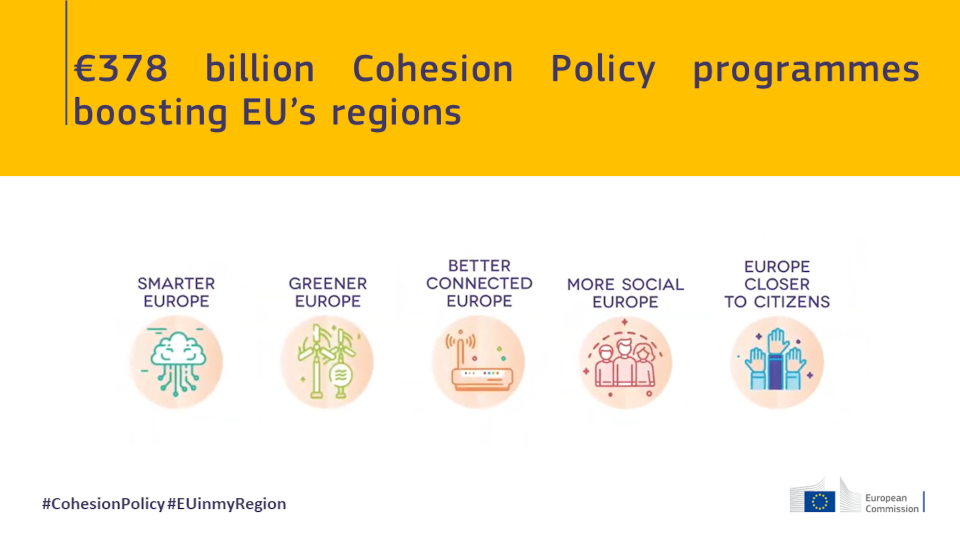The adoption of the decisions needed to get the 2021-2027 Cohesion Policy programming period up and running is now finalised allowing Member States to accelerate the investment of a total amount of €378 billion to foster the economic, social and territorial cohesion of the EU.
€378 billion Cohesion Policy up and running to boost EU’s regions
- 27 January 2023

These decisions include the 27 Partnership Agreements concluded between the Commission and each Member State setting out their Cohesion strategies until the end of the decade. They also include more than 380 regional and thematic programmes that will operationalise the investments on the ground from the European Regional Development Fund (ERDF), the European Social Fund + (ESF+), the Cohesion Fund and the Just Transition Fund (JTF).
Over the next years, in the face of geopolitical transformations, Cohesion Policy will remain key to ensure Europe’s harmonious and sustainable development through:
- Place-based, multilevel and partnership-led initiatives, tailoring its support to most vulnerable territories;
- Achievement of EU priorities in close synergy with other EU and national policies and instruments;
- Adaptability to emerging and unexpected challenges.
Economic, social and territorial cohesion
Cohesion Policy will continue to pursue its main objective, which is to reduce economic, social and territorial disparities between regions in the EU and accelerate the convergence of regions and Member States.
European Green Deal
With more than €92 billion, the new generation of Cohesion Policy programmes will play a pivotal role in supporting the European Green Deal. Investments will foster, for example, energy-efficient renovations of public and multi-residential buildings, increased deployment of renewable energy, enhanced climate change adaptation, a circular economy and the protection of nature and biodiversity.
Moreover, green investments will boost a climate-friendly mobility with better railway connections, sustainable urban mobility and new cycling infrastructures.
A major part of these investments will also support the achievement of the REPowerEU objectives, including decarbonisation and energy transition through energy saving, development of renewable energies, energy storage, hydrogen or green infrastructures.
For its part, the JTF will help achieving a just climate transition for all thanks to €19 billion that will be invested in regions relying on fossil fuels or high emission activities.
Digital transition
€13.5 billion will help EU regions improve their digital connectivity. Cohesion programmes will support the digital transformation of public administrations with ICT solutions, e-services and applications boosting the broadband capacity in Europe for citizens and SMEs. As a result, around 356,500 SMEs, for example, are expected to be equipped with high-capacity broadband providing faster, cheaper and better services.
In addition, more than €34 billion will support research and innovation, boosting the economic development and competitiveness of regions.
Fair and inclusive societies
An important part of Cohesion funding will address social challenges, with €106 billion supporting access to health care, education and training.
Cooperation beyond borders
Interreg is one of the key instruments of the EU supporting cooperation across borders. With a budget of €10.1 billion for 86 programmes, Interreg will support cooperation between border regions, citizens and economic stakeholders, helping them to tackle common challenges and find shared solutions in areas such as health, environment, research, education, transport and sustainable energy.
For the first time, funds are dedicated to improve cooperation of the EU’s outermost regions with their neighbouring countries to stimulate economic exchanges and mutual economic development.
Equally important, the ERDF-funded PEACE PLUS programme will continue to support peace and reconciliation between the border counties of Ireland and Northern Ireland, and to North-South cooperation under the Good Friday Agreement, the bedrock of the peace process in Northern Ireland.
Moreover, with a total amount of €665 million, six Interreg programmes will support cooperation with Ukraine and Moldova.
€1.1 billion under Interreg NEXT cooperation programmes will also improve cooperation with partner countries along the EU’s external borders.
Background
Cohesion Policy is the EU's main investment policy representing about one third of the EU budget. Its objective is to reduce economic, social and territorial disparities within the EU.
Thanks to several temporary dedicated flexibilities, Cohesion Policy has also helped EU regions to deal with the consequences of the biggest crises in the EU, the Covid 19 pandemic and the Russian aggression against Ukraine.
